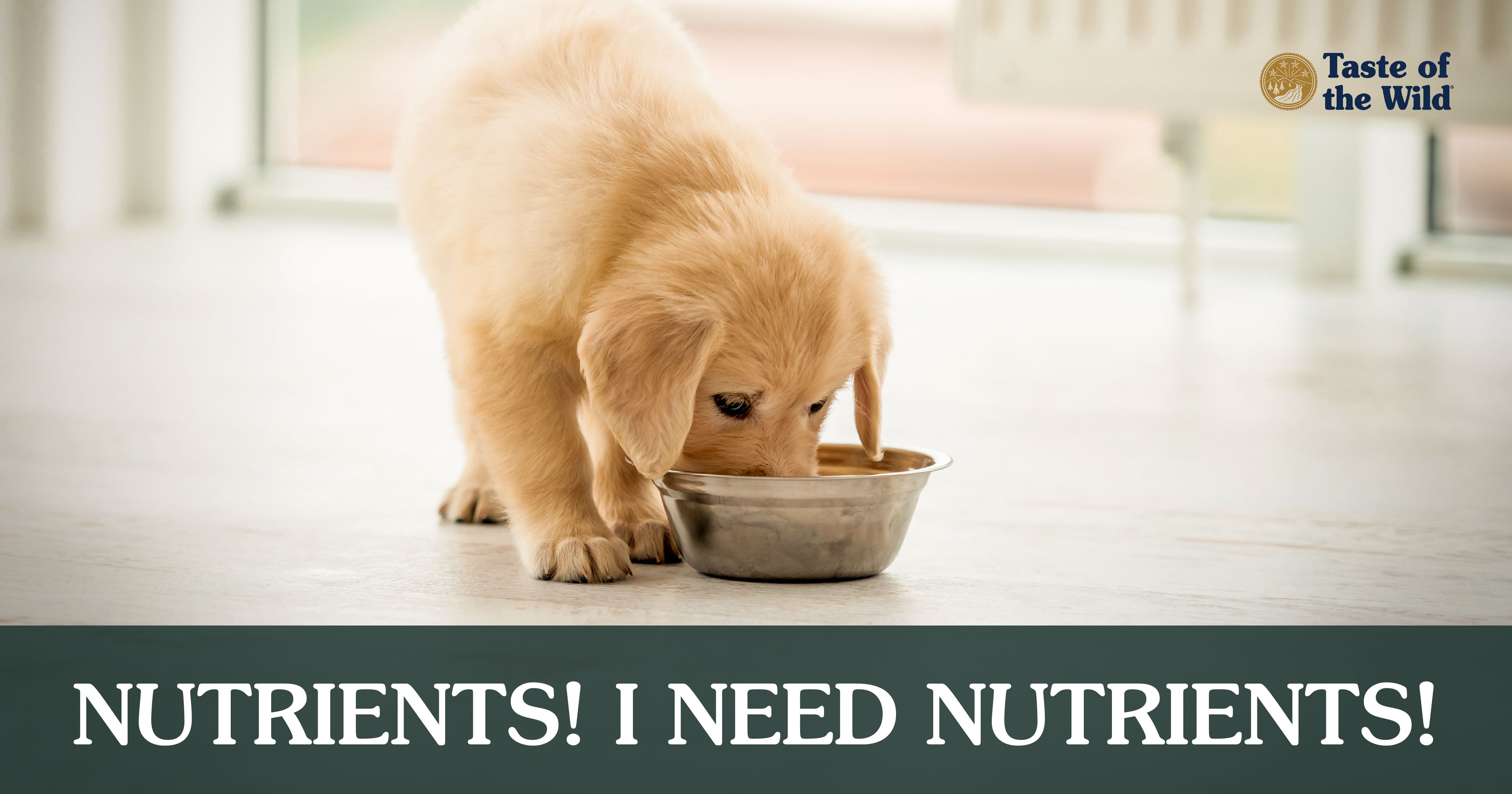
The right nutrition is essential for keeping your puppy healthy, but if you search online for “What’s the best puppy food?” you’re going to get a LOT of options. You want the very best for your puppy to ensure they grow up healthy and strong, so how do you choose which food is actually the “best” for them?
Puppies have different nutrient requirements compared to adult dogs, and all of those nutrients have specific roles in fueling the needs of an energetic and fast-growing puppy. We’ll discuss why particular nutrients are important for puppies and explain which statements you should be looking for on the dog food label to determine the “best” food for your pup.
GROW PUPPY, GROW!
You bring home your new puppy and — Bam! — a few short months later they’re not your tiny little puppy anymore. The first three to six months of a pup’s life is the most rapid growth period, and most puppies (except giant breeds) will reach 80 percent of their adult weight between 4.5 and 8 months of age.
All this growth is why puppies have nutrient needs that are different from adult dogs, who need nutrients only for maintenance (unless they’re pregnant or lactating). Maintenance requirements means adult dogs have enough nutrients to satisfy normal tissue repair and physical activity, and if they have any extra energy (calories) left over, it’s stored as fat.
GROWING PUPPIES NEED MORE NUTRIENTS
Compared to adult dogs, puppies need more of most of the essential nutrients, and like adults, their health depends on receiving those nutrients in the correct amounts and proportions. Nutritional factors that are particularly important for puppies include energy, protein, calcium, phosphorus, DHA (docosahexaenoic acid) and antioxidants. Let’s dive deeper into why those nutritional factors are important for puppies.
ENERGY IS YOUR PUPPY’S FUEL
It doesn’t matter whether your pup is a shiba inu or a Saint Bernard, the amount of energy they need for growth will be greater than at any other life stage except lactation. After weaning, puppies need twice as much energy per pound of body weight as adult dogs of the same weight. As your puppy’s growth rate starts to decline, their energy requirement will also start to decrease (usually around 6 months of age).
But be careful… too much of a good thing can lead to a chubby puppy. Your puppy needs to have their energy needs met for optimal growth (not maximal growth), so it’s important not to overfeed them. If they eat too many calories, it can lead to an increased growth rate and an overweight or obese puppy, which in turn could become an overweight or obese adult dog with an increased risk of health issues.
PROTEIN IS VITAL FOR A HEALTHY PUPPY
Protein, which is found in every cell of your puppy’s body, is important for building and maintaining muscle, bone, cartilage, skin and multiple organs. Puppies need more protein than adult dogs because puppies are growing all of those protein-dependent body parts. Protein also supplies the amino acids necessary to support a heathy immune system and to synthesize hormones, antibodies and enzymes.
The protein in your puppy’s food should be highly digestible to ensure all essential amino acids are delivered to and used by your puppy’s body for growth and development. Protein-containing ingredients in pet food include meat muscles (e.g., bison, venison, beef, lamb), meat meal (e.g., chicken meal, duck meal, lamb meal), fish, fish meal (e.g., salmon meal), eggs and ancient grains (e.g., chia seed, millet, quinoa and grain sorghum).
A HEALTHY SKELETON NEEDS CALCIUM AND PHOSPHORUS
Calcium and phosphorus partner together to keep your pup’s bones and teeth healthy. Nearly all the calcium and most of the phosphorus in your puppy’s body are found in their teeth and skeleton. Puppy foods have slightly higher levels of calcium and phosphorus to promote a skeletal growth rate that is appropriate for a puppy’s size.
Calcium requirements vary based on breed size. It’s important that large- and giant-breed puppies have the proper calcium-to-phosphorus ratio in their food, as they are especially prone to developmental bone issues.
DHA HELPS YOUR PUPPY’S BRAIN AND VISION
The omega-3 fatty acid DHA helps support brain and vision development in your puppy. DHA is found in mother’s milk, and studies have shown that the benefits of DHA in the diet continue after weaning. Research has also shown that trainability can improve when DHA is included in a puppy’s food.
ANTIOXIDANTS SUPPORT IMMUNITY AND OVERALL HEALTH
Antioxidants like vitamin E, beta-carotene, vitamin C, zinc and selenium support your puppy’s developing immune system and may help it respond to vaccinations. Antioxidants also help protect your pup’s body from the damaging effects of free radicals. Some of the ingredients in pet food that are sources of antioxidants include chia seed, quinoa, blueberries, raspberries, tomato and sweet potato.
LOOK AT THE PET FOOD LABEL
As you can see, growing puppies have very different nutrient requirements as compared to adult dogs. The “best” food for your puppy is one that is a complete and balanced diet and displays the Association of American Feed Control Officials (AAFCO) nutritional adequacy statement for “growth” or “all life stages.” If your puppy is a large breed, make sure the AAFCO all life stages statement also says, “including growth of large size dogs (70 lb. or more as an adult).” These statements ensure your puppy’s nutritional needs will be met by the nutrients in the food.
With so many choices available, choosing the right food for your puppy can be overwhelming. If you need help, your veterinarian can determine which foods meet the nutritional needs of your puppy. Then you just have to work out which flavor they like best!
